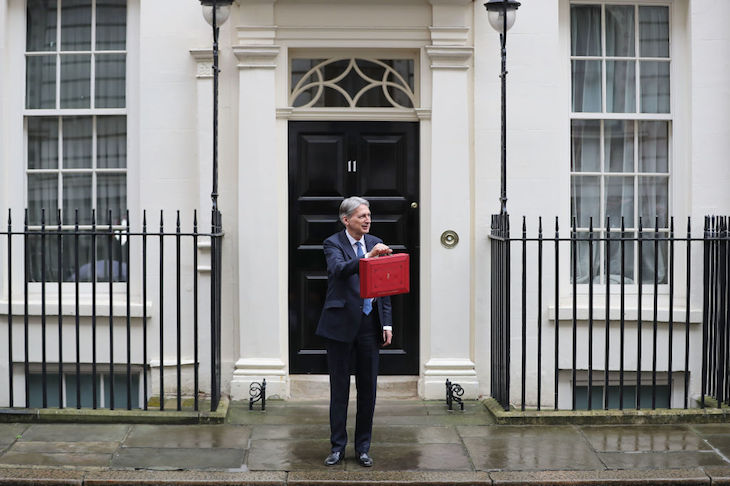The Chancellor sounded purposeful when he declared that he’ll do ‘whatever it takes’ to boost the rate of housebuilding — including pushing developers and councils to use up land banks and act on existing planning permissions — with a view to hitting a politically symbolic target of 300,000 units per year. But I wonder whether the post-Budget small print will reveal any sort of plan to overcome the most basic obstacle to achieving this objective, which is a critical shortage of bricks?
When housebuilding went into sharp decline after the 2008 crisis, many British brick factories closed down. To build even half of Philip Hammond’s target, the industry needs more than 2.5 billion bricks per year; but domestic manufacturers, operating at half the production levels of a few years ago, can no longer supply them. Meanwhile imports are slow and, thanks to the weak pound, increasingly expensive — and timber–based or prefab alternatives are subject to fierce post-Grenfell fire-safety scrutiny as well as being largely unfamiliar in a sector weaned on century-old building methods. Oh yes, and our construction industry is at risk of losing up to 175,000 EU workers.
It may console the embattled Hammond that no one expects him to be in post long enough to measure performance against this and other promises; with his entrepreneurial background, perhaps he might open a brickworks for his next career.
Put a sock in it, mate
I’m intrigued by Tim Martin, founder of the J.D. Wetherspoon pub chain, who is the BBC’s pro-Brexit businessman of choice in a tight race with vacuum cleaner king Sir James Dyson. What makes Martin a media favourite is his matey blokeishness, enhanced by a mullet hairstyle and a Rambling Syd Rumpo accent which is somehow the product of a middle-class upbringing in New Zealand and Belfast. ‘The public’s message to Carolyn “We’re all doomed” Fairbairn [of the CBI]… and other gloomsters is: put a sock in it,’ he declared in a Wether-spoon trading statement last month, so no wonder Brexiteers love him. But he still talks largely in pre-referendum slogans and when Nick Robinson on a recent Today programme bowled him a googly about complex supply chains in the car industry, Martin’s answer verged on the fatuous: ‘I have a supply chain from Europe. We buy a lot of our food, beer and wine from Europe, and it’s not a problem if we leave next week…’
An acquaintance who has done business with Martin tells me he’s ‘a free thinker, a contrarian, one of those people who can really surprise you’ and that his Brexit ardour is based on patriotic principle rather than anything to do with his pubs, which will continue to need large numbers of EU migrant staff. My source also says that despite a £300 million fortune, Martin has little interest in status, or in being seen as a serious political figure. In which case I’d advise him to stick to pulling pints.
Things fall apart
Even if Theresa May has cabinet support to make a higher offer for the Brexit divorce settlement, progress towards UK-EU trade talks are still likely to stall — as I warned three months ago — over the issue our ministers have so far treated as no more than an irritating distraction: the Irish border. Since last summer they have batted away all questions as to how two countries that are not in a customs union can avoid having the ‘hard’ border neither side wants along with warnings that a botched solution might reignite the Troubles. The DUP deal to hold the Tories in power added new provocation, while the degree of neighbourly sentiment was indicated this weekend by the Sun, which responded to Taoiseach Leo Varadkar’s demand that details of how the border will operate must be written down before trade talks commence, by telling him to ‘shut his gob and grow up’.
‘A major breakdown seems imminent,’ says my Dublin mole. And if ‘the blood-dimmed tide is loosed’ again, to borrow from Yeats, Mrs May and her incompetent crew will be clearly to blame.
Art market operators
Now the hubbub has subsided after last week’s sale of Leonardo’s ‘Salvator Mundi’ at Christie’s New York for $450 million, we can assess whether the record-shattering price was an indicator of an impending turn in the boom-bust cycle or merely an extreme example of art market operators conspiring to ease the burden of the super-rich. Yes, the era of cheap money and asset-price inflation has gone on too long and there are signals everywhere, from the madness of Bitcoin to the nervousness of IPO markets, that a downturn is due. But my own conclusion is that the Leonardo sale was less of a bellwether and more of a freak show.
The only people I can admire in this story are the art dealers who spent $10,000 at an estate sale in 2005 to buy a damaged painting previously considered fake, had it restored and authenticated, and sold it for $80 million eight years later. That was smart work, but next came dark comedy. The $80 million buyer, high-flying Swiss art dealer Yves Bouvier, sold it for $127 million to Monaco-resident ‘fertiliser oligarch’ Dmitry Rybolovlev, whose subsequent suspicion that he had been ripped off has been assuaged by last week’s $300 million windfall. Among rumoured bidders were billionaire former Shanghai taxi driver Liu Yiqian and representatives of the incongruous new Louvre Abu Dhabi. As for Christie’s, we might grudgingly respect the slickness of a PR campaign that turbocharged the painting’s ‘iconic’ status and put it in a contemporary sale that would draw big money, rather than in the Old Masters arena, where sceptics lurk.
Perhaps no one dreamed the bidding would soar so high but this really isn’t a transaction to boast about. Justice might be served by sending the whole pantomime cast into the jungle, clutching their unlovely artwork, as contestants in I’m a Celebrity…







Comments